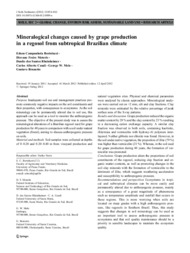Mineralogical changes caused by grape production in a regosol from subtropical Brazilian climate.
Mineralogical changes caused by grape production in a regosol from subtropical Brazilian climate.
Author(s): BORTOLUZZI, E. C.; MOTERLE, D. F.; RHEINHEIMER, D. dos S.; CASALI, C. A.; MELO, G. W. B. de; BRUNETTO, G.
Summary: Purpose Inadequate soil use and management practices promote commonly negative impacts on the soil constituents and their properties, with consequences to ecosystems. As the soil mineralogy can be permanently altered due to soil use, this approach can be used as a tool to monitor the anthropogenic pressure. The objective of the present study was to assess the mineralogical alterations of a Brazilian regosol used for grape production for 40 years in comparison with a soil under natural vegetation (forest), aiming to discuss anthropogenic pressure on soils. Material and methods Soil samples were collected at depths of 0?0.20 and 0.20?0.40 m from vineyard production and natural vegetation sites. Physical and chemical parameters were analysed by classic approaches. Mineralogical analyses were carried out on <2 mm, silt and clay fractions. Clay minerals were estimated by the relative percentage of peak surface area of the X-ray patterns. Results and discussion Grape production reduced the organic matter content by 28% and the clay content by 23% resulting in a decreasing cation exchange capacity. A similar clay fraction was observed in both soils, containing kaolinite, illite/mica and vermiculite with hydroxy-Al polymers interlayered. Neither gibbsite nor chlorite was found. However, in the soil under native vegetation, the proportion of illite (79 %) was higher than vermiculite (21 %). Whereas, in the soil used for grape production during 40 years, the formation of vermiculite was promoted. Conclusions Grape production alters the proportions of soil constituents of the regosol, reducing clay fraction and organic matter contents, as well as promoting changes in the soil clay minerals with the formation of vermiculite to the detriment of illite, which suggests weathering acceleration and susceptibility to anthropogenic pressure. Recommendations and perspectives Ecosystems in tropical and subtropical climates can be more easily and permanently altered due to anthropogenic pressure, mainly as a consequence of a great magnitude of phenomena such as temperature amplitude and rainfall that occurs in these regions. This is more worrying when soils are located on steep grades with a high anthropogenic pressure, like regosols in Southern Brazil. Thus, this study suggests that changes in soil mineralogy can be used as an important tool to assess anthropogenic pressure in ecosystems and that soil quality maintenance should be a priority in sensible landscapes to maintain the ecosystem quality.
Publication year: 2012
Types of publication: Journal article
Unit: Embrapa Grape & Wine
Keywords: Alteração mineralógica, Brasil, Manejo, Mineral, Potássio, Pressão antropogênica, Regossolo, Solo, Tecnologia, Uva, Viticultura
Observation
Some of Embrapa's publications are published as ePub files. To read them, use or download one of the following free software options to your computer or mobile device. Android: Google Play Books; IOS: iBooks; Windows and Linux: Calibre.
Access other publications
Access the Agricultural Research Database (BDPA) to consult Embrapa's full library collection and records.
Visit Embrapa Bookstore to purchase books and other publications sold by Embrapa.

